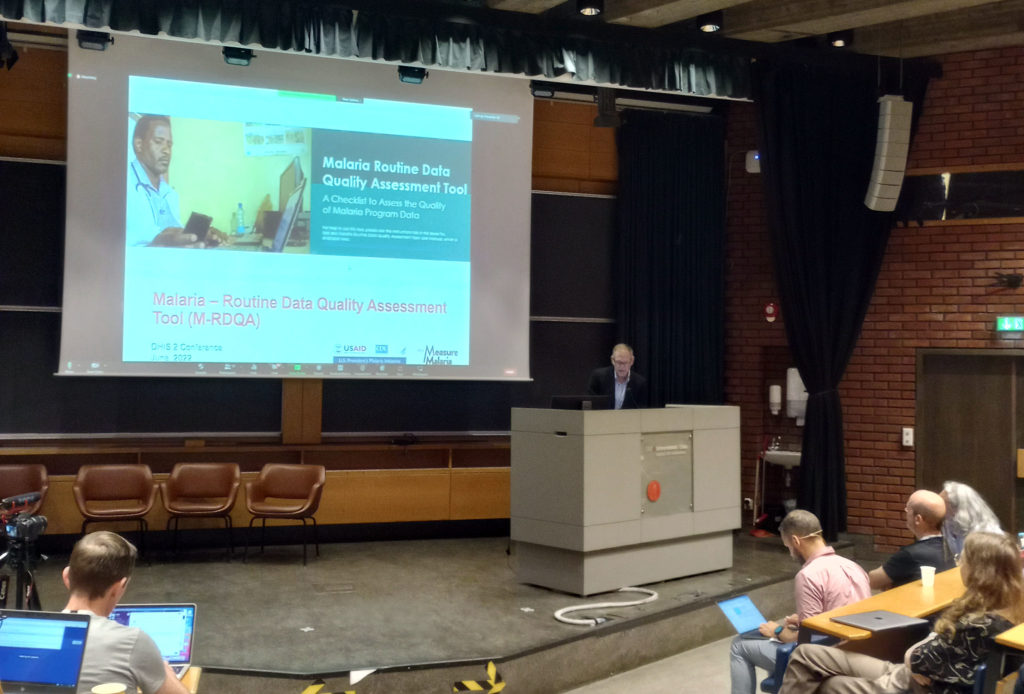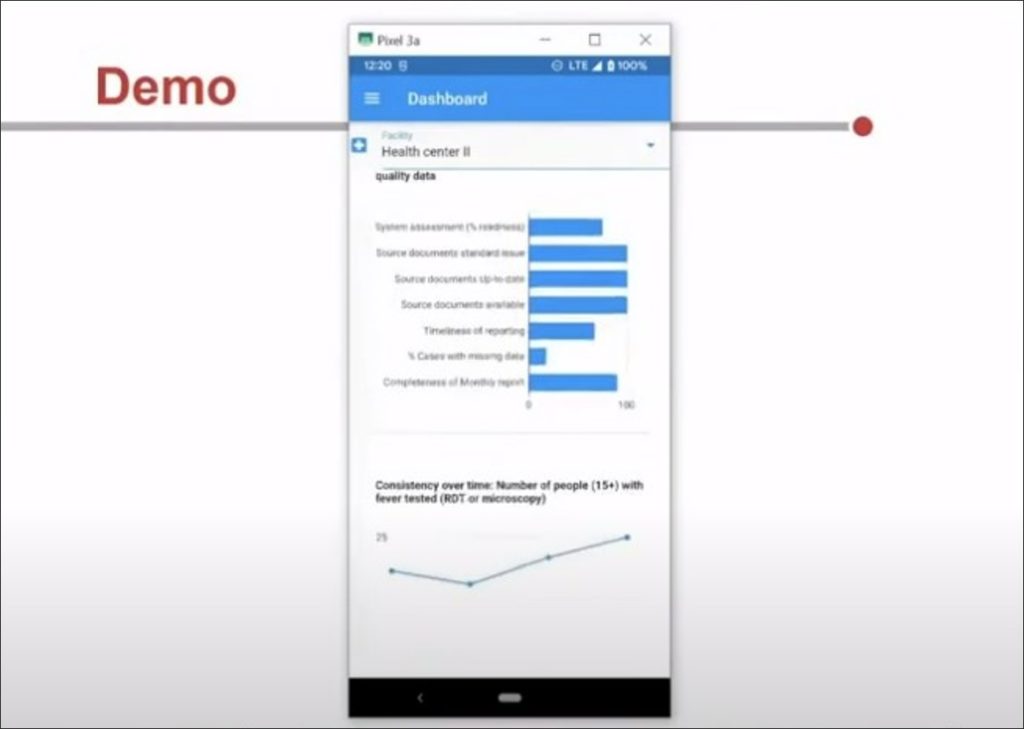PMI Measure Malaria Develops Android App Designed to Improve Data Quality

The PMI Measure Malaria team developed a new Android app designed to assess data quality at health facilities. The app is based on the Malaria Routine Data Quality Assessment (M-RDQA) tool and intended to be used as part of routine supportive supervision visits by district health teams at the subnational level and/or malaria program managers. Building on the Excel version of the tool, the app allows users to upload results to a national DHIS2, permitting a more centralized and holistic monitoring, coordination, and response to data quality issues.
The app facilitates the review of data in source documents (client registers, client encounter forms, commodity stock cards, monthly summary forms, etc), where data on malaria service delivery is first recorded. The quality of data in source documents is critical since all aggregate indicator values are based on these first recorded values.
This type of quality check is sometimes overlooked since it requires a visit to a health facility.
On Data Quality Assurance
“We can all agree that data quality assurance is important, but let’s face it… It’s no fun. I like to think of it like housekeeping—no one wants to do it, but if it doesn’t get done, things get pretty funky,” notes Dr. David Boone an epidemiologist with JSI and the PMI Measure Malaria team that developed the app.
This type of data quality assessment is often done by health facility surveys, which are infrequent, due to the intensive effort and expense required. Meanwhile, data quality checks done during supportive supervision visits are often not done in a systematic way in terms of what is being assessed, how it is being assessed, and when.
The M-RDQA tool was originally developed in Excel and has already been used in eight U.S. President’s Malaria Initiative (PMI) countries. The tool was adapted from the WHO/MEASURE Evaluation Data Quality Review Tool (DQR) supervision checklist so is aligned with global standards for data quality assessment.
“For data managers and health workers that are not comfortable with Excel tools, the app is easy to use,” notes Dr. Leontine Gnassou, SME Advisor for Measure Malaria Côte d’Ivoire, where the app was pilot tested.
Getting a Better Picture of Where There are Problems

The development of the Android app will help facilitate the use of the M-RDQA tool and aggregation of data to subnational and national levels. Standard aggregate data on accuracy, timeliness, completeness, and consistency will enable PMI Measure Malaria to evaluate trends and compare results across facilities, districts, and regions.
“Over time, it will enable us to get a better idea of where problems are occurring,” notes Dr. Boone. The hope is that a more coordinated and standardized approach to routine data quality checks will help program managers understand what needs to be done and where.
“Resources for data quality improvement can be more efficiently targeted if we know precisely what problems are occurring and where,” notes Dr. Boone.
Metrics that can be collected and analyzed with the M-RDQA app include:
- Completeness of reporting, data elements, and source documents
- Timeliness
- Accuracy checks against monthly summary reports and the HMIS database (i.e., DHIS2)
- Consistency over time
- System assessments (e.g., qualitative assessment to determine ‘readiness’ to produce good quality data)
Results from data quality checks can be shared with the health facility in real time using a dashboard built into the app or exported to a text file for further analysis and/or integration with other results.
The app also includes the ability to record recommendations on steps to take for improving data quality at the facility (i.e., data quality improvement plans), which can then be tracked and followed-up at the next facility visit.
The app is accompanied by a “DHIS 2 Configuration Package,” unavailable in the Excel version of the tool, which includes meta data and dashboards to permit the uploading of results to a national instance of DHIS2 where it can be aggregated with results from other supervisory visits around the country. The results can then be viewed and analyzed on the pre-configured dashboards.
While there is no silver bullet for improving data quality, notes Dr. Boone, the tool can provide the necessary information for addressing data quality gaps.
“This still requires effort and commitment on the part of health programs and Health Information System personnel at all levels,” he notes.
Pilot Testing and Beyond
In June 2022, the app was pilot tested in Sierra Leone and Cote d’Ivoire. There are a few bugs that still need to be worked out before the app can be rolled out to a wider audience. In the meantime, the team is developing guidance on how to use the app, which will be made available in the DHIS2 repository and the Google Play store. The app was recently featured as a finalist in the 2022 DHIS 2 Annual Conference android app competition.
While the app is currently devoted to the collection of malaria data, it can be easily adapted to other health and disease programs. The developers believe the app will improve coordination of data quality checks and the use of findings for data quality improvement.
The app doesn’t replace the commitment needed at the national and district levels to collect the data, track results over time, and develop and implement interventions to improve data quality.
To learn more about the app, please contact David Boone, at david_boone@jsi.com.
The user manual for the Malaria Routine Data Quality Assessment tool can be found online here: https://measuremalaria.cpc.unc.edu/publications/malaria-routine-data-quality-assessment-tool-user-manual/